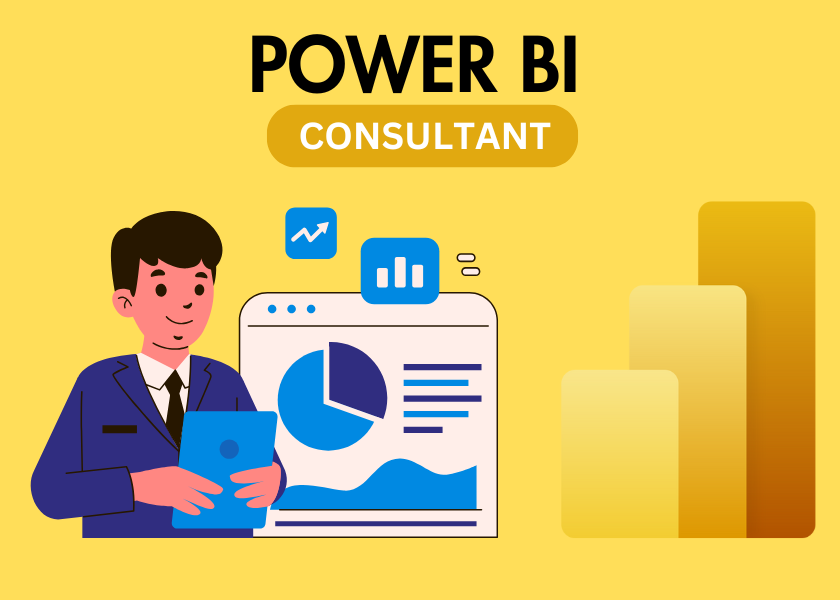
If you’re in the market for a Power BI consultant, you might be wondering how to ensure you hire Power BI consultant for your specific needs. With so many options out there, it can be a daunting task to find the perfect fit.
In this comprehensive blog post, we’ll guide you through the process of identifying the type of consultant you need and the key factors to consider when making your decision.
Three factors to consider when you decide to hire Power BI Consultant:
If you know what dashboard you need to produce and what data you need to use as a client, there is nothing wrong with hiring for cost-effectiveness.
In this scenario, you would have a good understanding of your problem, and you would know how to solve it, all you are missing is the technical know-how.
There are a few ways to test the technical know-how:
Microsoft certification such as PL 300
Any portfolio pieces demonstrating the knowledge of DAX and data modelling.
Specific experience – as a client you would know your problem but you don’t exactly know how to solve it.
For example you want to visualise Xero data in Power BI. However, you don’t know how to automatically extract data from it or have no knowledge of Xero data model.
You can not guide someone in terms of what tables and columns need to be used to produce the dashboards that you need.
There are a few ways to test for experience:
Portfolio pieces
Case studies
Testimonials
Reviews
For example, we have a section on our website for Power BI connectors and dashboards that I built.
For every portfolio piece I mention what data sources were used. Any consultant who tries to sell their experience will have something similar to demonstrate it.
As a client you know what your problem is but you can’t scope a project based on it.
As a result the project scope is open-ended and you need a consultant to step it and help you define it.
For example we did a project for Google. They were fined 100M EUR for missing a piece of legislation that just came out at a time.
After this they decided to invest into gathering the data on what legislation came out, in what country, which products are impacted, what is the level of risk, etc.
However, they had no clear idea on how to visualise this data effectively to monitor the risks.
There are a few ways I helped them to resolve the issue:
I created a doc summarising the business questions that needed to be answered, what formula we should write to answer those questions and what graph we should use for visualising the data
Before the project start I told them some of my ideas for how I was proposing to measure the problem.
Now that you have a better understanding of the different types of consulting needs, let’s dive into the key factors to consider when evaluating potential Power BI consultants.
1.Technical Expertise
Regardless of the type of project, it’s essential to ensure that the consultant you choose has the necessary technical skills and certifications in Power BI. Look for:
2. Specialized Experience evaluation when hire Power BI Consultant
If you’re looking for a consultant with specific expertise, such as working with particular data sources or creating visually appealing dashboards, be sure to thoroughly vet their experience in these areas. Look for:
Problem-Solving and Strategic Thinking
For more complex, open-ended projects, you’ll want a consultant who can think creatively and strategically to help you define the right KPIs and develop a custom solution. Look for:
Now that you have a better understanding of the different types of Power BI consulting needs and the key factors to consider, let’s walk through the process of selecting the right consultant for your specific project.
Step 1: Identify Your Consulting Needs
Start by clearly defining the type of consulting you require. Is it a cost-effective solution, specialized expertise, or an intelligent, custom-tailored approach? Understanding your specific needs will help you narrow down the pool of potential consultants and ensure you find the best fit.
Step 2: Evaluate Candidate Consultants
Once you’ve identified your consulting needs, begin researching and evaluating potential Power BI consultants. Review their technical certifications, years of experience, portfolio of past projects, and any relevant specialized expertise. For more complex projects, pay close attention to their problem-solving abilities and strategic thinking skills.
Step 3: Assess Fit and Compatibility
After shortlisting a few promising candidates, schedule interviews or consultations to assess their fit and compatibility with your project. Pay attention to their communication style, responsiveness, and ability to understand your specific challenges. A good consultant should be able to quickly grasp the problem and provide valuable insights.
Step 4: Check References and Reviews
Before making your final decision, be sure to check references and read reviews from the consultant’s previous clients. This will give you a better understanding of their reliability, professionalism, and the quality of their work.
Step 5: Make Your Selection
Considering all the factors you’ve evaluated, make your selection of the Power BI consultant who best fits your needs. Remember, hire Power BI Consultant that is right for your needs can make a significant impact on the success of your Power BI project, so take the time to find the perfect match.
By following these steps and keeping the key factors in mind, you can be confident that you’ll find the right Power BI consultant to help your business achieve its goals.
The role of a Power BI Consultant is vital for organizations aiming to harness the full potential of their data. By implementing robust business intelligence solutions, these professionals help businesses gain valuable insights that drive strategic decision-making.
As demand for data-driven strategies continues to grow, the expertise of Power BI consultants will remain increasingly important in various industries.